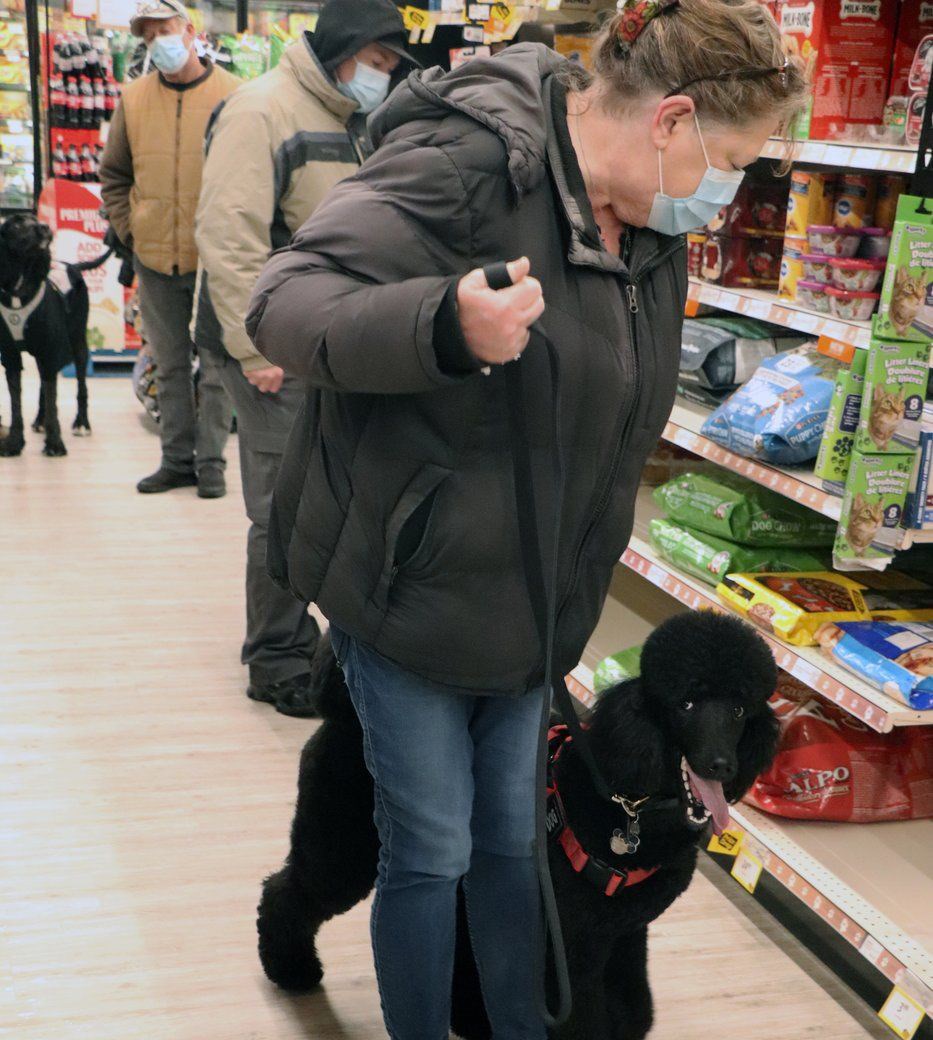SHAUNAVON - Shaunavon was recently the host to Meliora Service Dogs, a non-profit organization that does training for service dogs with their owners.
A group of volunteers from Redcliff, Alta. was in town to test Montego, a local 10-month-old Standard Poodle service dog in training, and his handler Annette Hewitt.
“At Meliora we do service dog team training, so it always includes the person and the dog together, it's not about just a dog or a service dog,” said Marc LaPointe, a certified medical service dog trainer.
The team ran through the behavior assessment protocol with Montego in the Co-op parking lot during a visit to Shaunavon in December.
LaPointe explained what sort of exercises they were doing with Montego, and why they were doing it.
“Basically, we're gently stressing the dog with sound movements, touches, things like that, things that the dog is not used to at the moment, and we're kind of overwhelming the dog to see if there is aggression, fear or anxiety,” he said.
“We want everything to be safe for the public, for other dogs, but also safe for the person that's handling the dog,” he added.
Stage two of the process saw the team test Montego to see how he would react to having items like food or toys taken away, to see if he showed any aggression or was attracted to the items.
The last portion of the test is socialization, where the team brought out two other dogs, to see how Montego would react to being around other animals.
“Is this dog socialized enough to be a good dog with other dogs? So once they've finalized the socialization part, we know this dog is safe," he stated. "So we do stress, stress, stress, handling, handling, handling . . . to see how the dog reacts,” explained LaPointe.
Once they know the dog is safe, they conducted the same types of tests inside the Co-op store, which included walking around the retail outlet with Montego, slamming freezer doors, dropping treats on the floor to see how he would react, and exposing the dog to busy environments.
“We do all these little scenarios. If the dog is still safe and focused, then we start training. Today is more of a selection phase. And if the dog is safe, the handler is safe too, because he's aware of what's going on around them. Then we proceed with the training of the service dog from there,” said LaPointe.
Service dogs perform a variety of tasks to provide support in activities of daily living for a wide range of challenges, including guiding persons who are blind; alerting persons who have hearing impairments to the presence of people or sounds, such as an alarm or telephone; pulling a wheelchair; recognizing specific changes that happen before a seizure and alerting a person; and providing assistance to a person with post traumatic stress disorder by providing a barrier against other people crowding too close to the person.
"The dog has changed my life," smiled Hewitt, who has Montego as her diabetic alert dog.
"I used to test up to 400 times a month, my testing has gone down to three times a day, because my dog lets me know when I'm going low," explained Hewitt. "I can't feel when I'm going low."
When Hewitt's blood sugar levels drop, Montego will go get her honey, her test kit, and her cellphone. Montego is also registered with 911, so if Hewitt needs to call but cannot speak and Montego is barking, they know where to send someone.
"A while ago my sugars dropped down to two. I didn't feel a thing and he was sitting right beside me," said Hewitt. "He just got up and looked at me and ran upstairs, brought me down my honey, my test kits, pushed me back onto my chair, and stayed with me until my sugars came back up."
"My dog is worth my life, he's everything to me," she added.
LaPointe says service dogs are also important because they can help people who are struggling to get back onto the right path in life.
LaPointe described service dogs as "life changers" for people. They can even help get people out of their isolation or depression, and help them get back into healthy routines.
“Usually people, around a year or a year and a half after they've started training, find their life changes completely," he said.
In some cases the dogs can provide so many benefits that people can see their medications cut significantly.
"These people are re-socializing, reintegrating and giving back to the community,” he said.
LaPointe pointed out that they also have a peer support program for people with service dogs to get more help if needed.
To find out more information about service dogs and what Meliora does, check out their website




